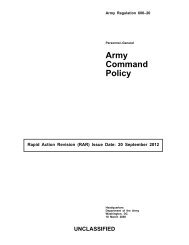Patient Administration - Army Publishing Directorate - U.S. Army
Patient Administration - Army Publishing Directorate - U.S. Army
Patient Administration - Army Publishing Directorate - U.S. Army
You also want an ePaper? Increase the reach of your titles
YUMPU automatically turns print PDFs into web optimized ePapers that Google loves.
5–14. Psychiatric patients<br />
a. At MTFs that do not furnish specialized psychiatric care, the patient will be transferred to an MTF that furnishes<br />
the required care. This procedure will apply when most of the available clinical evidence indicates a military patient<br />
has a psychiatric condition and treatment, observation, or evaluation for a period of 7 days is indicated. The transfer<br />
will normally take place within 7 days of the date of admission.<br />
b. At MTFs designated as psychiatric STSs, patients with psychosis ordinarily will undergo prolonged periods of<br />
observation to determine the permanency of the disability. The patient’s response to treatment will be evaluated as soon<br />
as practicable after a definite diagnosis has been made. When treatment does not result in substantial improvement,<br />
disposition will be made as quickly as practicable. Usually intensive treatment for a period of under 90 days will be<br />
sufficient to establish the degree of disability and provide optimum improvement. (See para 5-15 for processing of<br />
psychiatric prisoner patients.)<br />
c. A commander is responsible for exercising all reasonable measures to protect the personal affairs of a psychiatric<br />
patient as well as other members of the command. Legal assistance officers will be contacted for counsel and advice.<br />
Psychiatric Soldiers, despite their mental illness, may be sufficiently competent to execute a legally acceptable power<br />
of attorney or other instrument authorizing another person to act on their behalf in personal matters. Mental incompetence<br />
may vary in degree and in relation to specific situations. Opinion as to competency will be obtained from a<br />
psychiatrist on specific situations that arise in the settlement of personal affairs.<br />
5–15. Psychiatric prisoner patients<br />
When a prisoner suffering from psychosis is admitted to an MTF or local confinement facility, the MTF commander<br />
will ascertain whether the issue of insanity was raised at the time of trial or if there is anything in the record of trial<br />
that may support a reasonable doubt as to the patient’s sanity at the time of the offense or trial. If the information<br />
concerning the patient’s sanity is not in the patient’s available records, this information will be requested from HQDA<br />
(DAJA-CL), Washington, DC 20310-2200. When received, the information will be included with the patient’s ITR.<br />
(See para 7-6 for sanity board policy.)<br />
5–16. Notification of release of criminal <strong>Army</strong> members<br />
a. A criminal <strong>Army</strong> member, as used in this paragraph, is a psychiatric patient who has a history of reported<br />
involvement in major crimes or antisocial behavior and is considered to have significant potential for recurrence of<br />
such behavior. Examples are crimes of violence such as murder, rape, or prolonged absences associated with threats of<br />
violent behavior. When such patients have been administratively cleared for medical separation from the Service, they<br />
will be reported by the <strong>Army</strong> MTF to OTSG (DASG-HSZ), 5109 Leesburg Pike, Falls Church, VA 22041-3258.<br />
Copies of the following documents will be included in the notification, if available:<br />
(1) Applicable criminal investigation activities, military police, and/or civilian police investigations.<br />
(2) Investigations under the provisions of The Uniform Code of Military Justice (UCMJ), Article 32.<br />
(3) SJAs advice to the general courts-martial.<br />
(4) Record of trial.<br />
(5) Sanity board proceedings. (See para 7-6.)<br />
(6) MEB proceedings including a copy of the narrative summary (see para 7-24) prepared in lieu of sanity board<br />
proceedings or prepared separately.<br />
(7) Indictments, complaints, other investigative files, and court orders.<br />
(8) Proposed date, place, and basis of release from the MTF including identification of the receiving facility and<br />
estimated date of separation from the Service.<br />
b. Absence of any of the listed documents in a above must be explained.<br />
c. Reports required above will be dispatched no later than 72 hours before actual physical disposition (departure) of<br />
the patient from the MTF.<br />
d. If reporting as described in this paragraph is questionable, the case will be forwarded as prescribed in a above.<br />
e. Notifications prescribed by this paragraph are exempt from reports control under AR 335-15.<br />
5–17. Final disposition procedures for military patients<br />
a. <strong>Patient</strong>s who are fit for duty will be returned to duty as soon as possible. Attached military patients will be<br />
returned to their units of assignment. Those assigned to WTUs will be reported for reassignment per paragraphs 8-9<br />
and 8-10 (see chap 7 for MEB requirements).<br />
b. <strong>Patient</strong>s who are unfit for duty and are assigned to WTUs will be processed for separation by the transfer point<br />
which supports the MTF. <strong>Patient</strong>s who are not assigned to the WTU will be returned to their units of assignment for<br />
separation action. The additional instructions in (1) through (5), below, apply.<br />
(1) <strong>Patient</strong>s who are fit for retention but do not meet procurement medical fitness standards will be processed as<br />
provided in paragraph 5-3 and AR 635-200.<br />
(2) <strong>Patient</strong>s who have been referred to PEBs and are approved for continuance on AD as provided in AR 635-40<br />
will be processed according to instructions from the U.S. <strong>Army</strong> Physical Disability Agency (TAPD-PDB).<br />
42 AR 40–400 27 January 2010
















